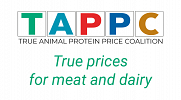The COP30 Declaration on the Reform of Agri-Food Systems
All Countries Urged to Prioritize Food System Reform at UN Climate Conference
Declaration Calls for Emission Pricing and Policy Reform to Address Climate Crisis and Food Insecurity
A broad coalition of over 150 NGOs, government representatives and international organizations today launched the COP30 Declaration to Reform Agri-Food Systems, urging the COP Troika Presidencies - Brazil, Azerbaijan, and the UAE - as well as all UNFCCC country delegations and Climate Ministers, to take decisive steps to transform global food systems at the upcoming COP30 Summit in Belém, Brazil and implement national food and agriculture climate policies, including GHG-emission pricing and taxation.
The Declaration is published at the start of the Bonn Climate Conference (16-26 June) where all UN countries and climate delegates negotiate and prepare decisions for the UN Climate Summit in Brazil, starting 9th November. TAPP Coalition initiated the Declaration and will present it during a UNFCCC facilitated press conference 24th June 9.30 am CET.
Building on momentum from COP29 in Baku, where 27 low-income countries and dozens of civil society organizations called for urgent reforms, the new Declaration sets out a clear path for aligning global food systems with the Paris Agreement. The coalition calls for action on four critical fronts:
- A Transition away from meat and dairy overconsumption.
- Redirection of agricultural subsidies to sustainable and plant-based alternatives.
- Implementation of greenhouse gas (GHG) pricing in food systems, with revenues partly supporting the Loss & Damage Fund.
- Incentivize Plant-Based Foods: adopt policies to increase availability of and consumer access to plant-based foods.
Food systems account for 33% of global GHG emissions, with animal agriculture contributing up to 20%. The Declaration cites findings from the FAO’s 2024 SOFA report and the World Bank, urging rich countries to increase taxes on meat and dairy and remove taxes on vegetables and fruit. It notes that meat consumption in OECD countries and China far exceeds planetary boundaries, contributing not only to climate breakdown but also to public health crises and global inequality.
The Declaration also refers to recent proposals from the European Commission, which is exploring an Agri-Emissions Trading System, and by policy shifts in Denmark and New Zealand towards livestock-based climate taxation starting by 2030.
A Growing Global Coalition
The 2024 COP29 Declaration, which this year’s effort builds upon, was signed by environmental ministers representing over 30% of the African population, including Nigeria, Uganda, Chad, and the Democratic Republic of Congo, as well as all 21 Pacific Small Island Developing States through SPREP and over 100 NGO’s.
A year later, the NGO coalition is larger and even more determined. Ministers, NGOs, and institutions can join by signing the declaration here before 1st of October 2025.
Looking Ahead to Belém
With COP30 taking place in the Amazon - one of the world’s most threatened ecosystems - leaders have a historic opportunity to show that climate action starts with what we grow, produce, and consume. Almost 80% of deforestation in South-America is linked to agriculture, especially soy for livestock and beef production.
Read the full Declaration and sign here.
Available in multiple languages: French, Spanish, Portuguese and Arabic.



